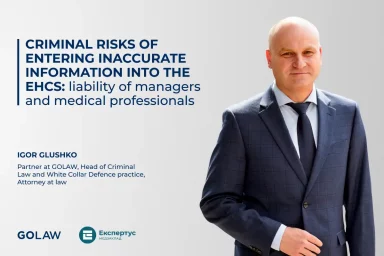LEGAL HOTLINE 31.05.2018
Tags
Contents
- GDPR – new rules for processing personal data
- Land moratorium violates the right of the Ukrainians to freely dispose of property
- Requirements for publication of financial statements of insurance companies have been changed
- To obtain the ECMT quota, carriers must confirm their financial status
- The Supreme Court has changed the approach to determining the value of property, which is paid to a member of the LLC, withdrawing the company
Legal news for your attention
GDPR – new rules for processing personal data
On May 25, 2018, Regulation (EC) 2016/679 (GDPR – General Data Protection Regulation) came into force. The Regulation is oriented to protection of fundamental rights and freedoms of individuals, in particular their right to protection of personal data, and also establishes new requirements for protection of personal data, which are mandatory in all EU Member States.
The Regulation is binding forall 28 EU countries and will replace the Framework Directive on personal data protection 95/46/EC as of October 24, 1995. It should be understood that GDPR has direct effect, and therefore does not require national governments to adopt any local law for its application. In addition, there is an extraterritorial principle: new rules are applicable to controllers and data operators located also outside the European Union, but their actions are related to
- supply of goods or services to data subjects (persons) in the European Union, regardless of whether they require payment from such entities;
- monitoring the behaviour of data subjects (persons), if such behaviour takes place within the European Union.
The new rules give the EU residents the tools for full control over their personal data. As of May 2018, the responsibility for violation of the rules for processing personal data is set forth, including fines amounting to 20 million euros or 4% of the annual global income of the company.
Land moratorium violates the right of the Ukrainians to freely dispose of property
On May 22, 2018 the European Court of Human Rights (hereinafter the “ECGR”) officially published on its web-site the decision “Zelenchuk and Tsitsyura against Ukraine” on a moratorium on the sale of agricultural land.
The ECHR stated that after collapse of the USSR, for the most part Ukraine distributed agricultural land between people who had previously worked in collective farms, but the authorities, on the other hand, imposed on a temporary basis a ban on the sale of such land, known as the “moratorium on the sale of the land.”
The government argued that such a measure prevents the concentration of land in one’s hands. However, the Court concluded that the moratorium violates provisions of Article 1 of the Protocol 1 (Protection of property) to the Convention for the Protection of Human Rights and Fundamental Freedoms, while the state did not ensure a fair balance between the common interests of the community and the applicants’ right to the property.”
The court stressed that the Ukrainian Government should take legislative measures to ensure a fair equilibrium for agricultural land owners by adopting more liberal legislation in this sphere.
As regards to the payment of monetary compensation by Ukraine, the Court noted that the plaintiffs’ claim is speculative because, in the absence of free market of agricultural land, it is impossible to determine its real market value and size of the losses incurred.
Requirements for publication of financial statements of insurance companies have been changed
Due to the changes provided for in the Law of Ukraine “On Amendments to Certain Legislative Acts of Ukraine Concerning Facilitation of Business and Investment Attraction by Securities Issuers” as of November 16, 2017 No. 2210-VIII, the National Commission for the regulation in the sphere of financial services markets approved amendments to the Procedure for Compilation of Reporting Data of Insurers.
From now on, insurers no longer have to publish their annual financial statements and consolidated accounts in periodicals. Such information, together with the report of the independent auditor, must be published on the official website of the insurer by April 30 of the year following the reporting year. Such data shall be disclosed in accordance with the disclosure requirements established by the legislation on financial services.
To obtain the ECMT quota, carriers must confirm their financial status
Relevant amendments to the Procedure for holding the tender and issuance of permits of the European Conference of Ministers of Transport (hereinafter the “ECMT”), envisaged by the order of the Ministry of Infrastructure as of May 4, 2018 No. 199, which will come into force on the day of publication.
Thus, carriers need to confirm the proper financial capacity, provided with fixed assets, current assets for a total amount of not less than 9 thousand euros for the first car and 5 thousand euros (or the equivalent in national currency) for each subsequent vehicle submitted for participation in the competition.
Previously, it was enough to have confirmed capital of at least EUR 4.5 thousand for the first car and EUR 2.5 thousand (or the equivalent in national currency) for each subsequent one.
The order stipulates that carriers who received ECMT permits to carry out transportations in 2018 will continue to use such permits before the expiration of their validity.
The Supreme Court has changed the approach to determining the value of property, which is paid to a member of the LLC, withdrawing the company
The Grand Chamber of the Supreme Court in its ruling as of April 24, 2018, in case No. 925/1165/14, determined that the value of a part of the company’s property payable to a member withdrawing from the LLC should be determined according to the actual (market) value of the object of valuation, taking into account all property of the company. The Court states that accounting of the property in the balance list at a certain cost is a unilateral voluntary act of the company, which cannot be an indisputable proof of the true value of such property.
The Supreme Court stressed the necessity to move away from the legal position stipulated in the decision of the Supreme Court of Ukraine as of November 18, 2014 in the case No. 910/10168/13, according to which the value of part of the company’s property subject to payment must correspond to the value of the net assets of the company, which is determined on the basis of the balance, compiled on the date of withdrawal (exclusion).
Thus, the Court finds that when a member withdraws from the LLC, the value of a part of the company’s property that must be paid to the member shall be determined according to the actual (market) value of the object of valuation, taking into account all the company’s property and not the balance value.

Oleksandr Melnyk
Partner, Head of Corporate Law and M&A practice, Attorney at law
- Contacts
- 31/33 Kniaziv Ostrozkykh St, Zorianyi Business Center, Kyiv, Ukraine, 01010
- o.melnyk@golaw.ua
- +38 044 581 1220
- Recognitions
- Lexology Index: Client Choice 2026
- The Legal 500 2025
- IFLR1000 2025 (International Financial Law Review)
- Legal 500 Green Guide 2024
- 50 Leading Law Firms Ukraine 2026
Sign up to be aware
New achievements are inspired by information. GO further, don’t miss out GOLAW news and legal alerts
Our expertise
-
- Energy and Natural Resources
- Antitrust and Competition
- Banking and Finance
- Compliance, Corporate Governance and Risk Management
- Corporate and M&A
- Criminal and White Collar Defence
- Defense in Anti-corruption procedures and regulations
- Digital Economy Practice
- Labor and Employment
- Natural Resources and Environment
- Government Relations (GR)
- Insolvency and Corporate Recovery
- Intellectual property
- International trade
- Legal support of business and private Сlients in Germany
- Litigation and dispute resolution
- Private clients
- Real Estate and Construction
- Restructuring, Claims and Recoveries
- Martial Law
- Tax and Customs
-
- Agribusiness
- Aviation
- Chemical industry
- Engineering, Construction and Building Materials
- Environment and Natural Resources
- Financial institutions
- IT and AI
- Industry and manufacturing
- Healthcare industries, Life sciences and Pharmaceuticals
- Media, Entertainment, Sports and Gambling
- Retail, FMCG and E-Commerce
- Transport and Logistics
We use cookies to improve performance of our website and your user experience.
Cookies policy
Cookies settings







